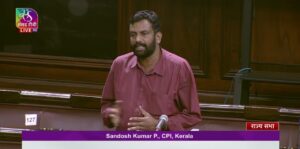ButSpeak.com
News which Matters.

CPI’s Rajya Sabha MP P Sandosh Kumar introduces a bill to establish the National Artificial Intelligence Regulatory Authority (NAIRA) to monitor and regulate AI and deepfakes.
Communist Party of India (CPI) Rajya Sabha MP P Sandosh Kumar introduced a Private Member’s Bill on Friday aimed at regulating artificial intelligence (AI) and deepfakes. The bill proposes the establishment of the National Artificial Intelligence Regulatory Authority (NAIRA) as the apex body responsible for the regulation and monitoring of AI and related technologies in the country.
According to the bill, NAIRA would be tasked with assessing the risks associated with AI, including threats to employment. The proposed authority would consist of a chairperson and two members appointed by the central government for a term of up to four years. The members are required to have experience in the field of AI and a thorough understanding of the ethical deployment of AI technologies, as well as the potential future threats posed by AI in replacing human jobs.
Kumar’s proposal follows the Economic Survey’s observation of the social impact of emerging technologies like AI, which cause significant uncertainty in the labor market across all skill levels. The survey also highlighted AI’s immense energy demand, calling it an “energy guzzler.”
In the bill, Kumar defines artificial intelligence as “a constellation of technologies that enable machines to act with higher levels of intelligence and emulate the human capabilities of sense, comprehend, and act.” Deep learning is described as a method in AI inspired by the human brain’s data processing capabilities, while machine learning is defined as the study of statistical algorithms that learn from data and generalize to perform tasks without explicit instructions. Deep fakes are identified as digitally altered media that replaces a person’s face or body with another’s.
NAIRA’s responsibilities would include developing the regulatory landscape for AI adaptation, identifying privacy challenges, addressing complaints related to the deprivation of workers’ rights due to AI replacing human labor, and acting as a grievance redress mechanism. The government’s nodal ministry, the Ministry of Electronics and Information Technology (MeitY), has been considering regulating AI and deepfakes. Earlier discussions on amending the Information Technology Rules, 2021, to regulate deepfakes gained momentum but stalled after the general elections.
MeitY has also released advisories on AI deployment, initially requiring government permission for deploying AI models, later replaced with a less stringent advisory. There is recognition within MeitY that a comprehensive law addressing AI challenges may take time, and the ministry is exploring ways to implement checks and balances through rules or policies without stifling innovation in the evolving field of AI.